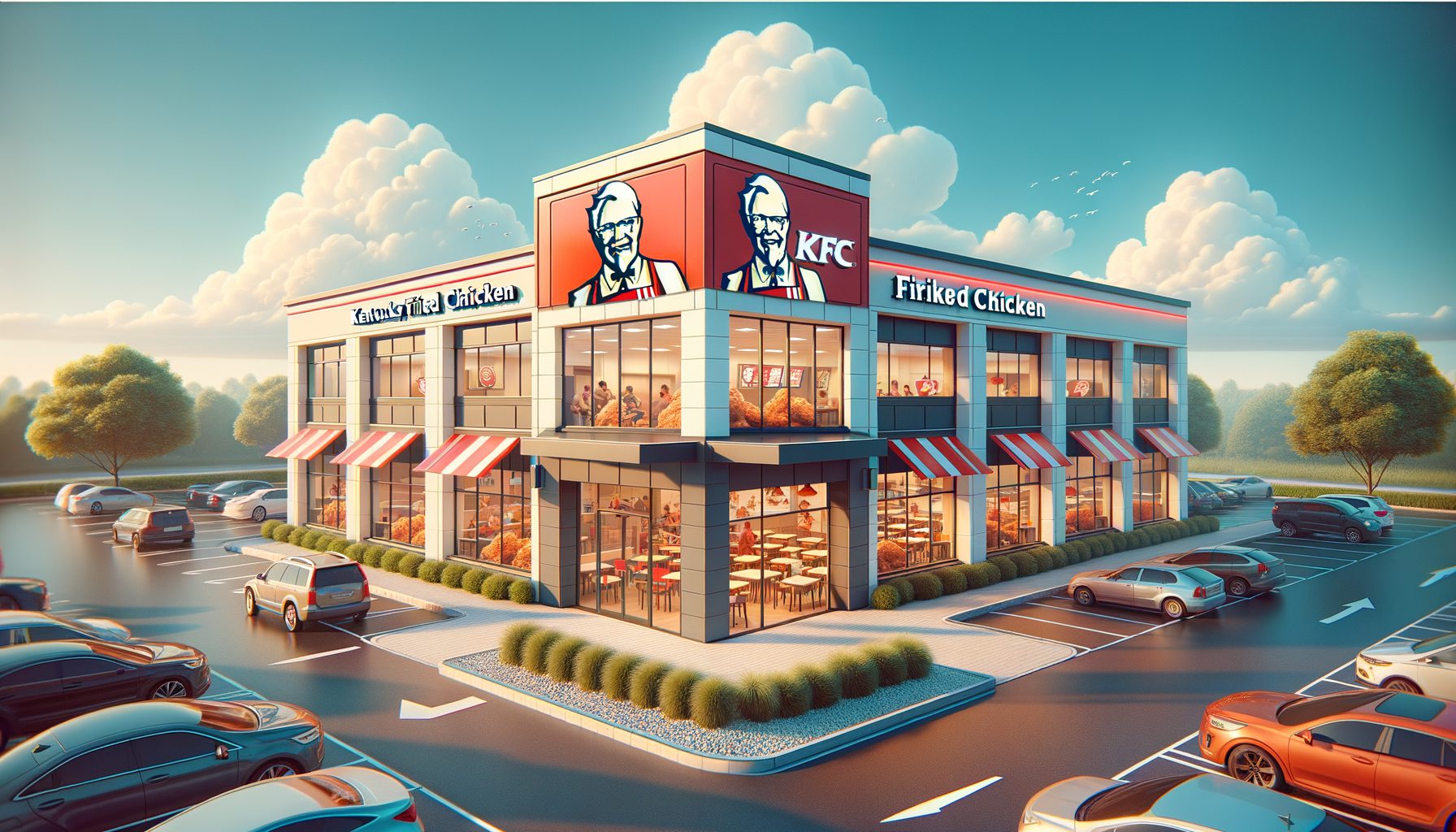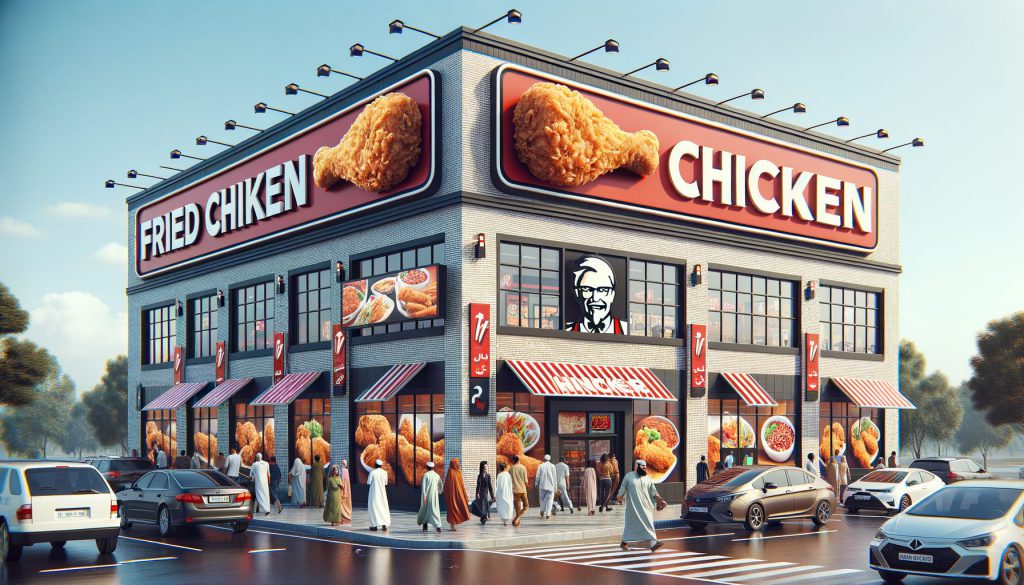How Much is a KFC Franchise

Share:
Kentucky Fried Chicken, better known worldwide as KFC is one of the most iconic and successful fast food chains globally. With over 25,000 locations in 145 countries, KFC is the second-largest restaurant chain after McDonald’s. For entrepreneurs interested in buying into this juggernaut brand, here is an in-depth look at the costs, fees, and potential profits of opening a KFC franchise.
Upfront franchise investment
The total initial investment to open a new traditional KFC franchise ranges from $1.4 million on the low end to $3.1 million on the high end. This includes the franchise fee, real estate purchase or lease, building construction, equipment, signage, opening inventory, training, grand opening marketing, and 3 months of operating expenses.
Franchisees must also have at least $750,000 in liquid personal capital that can be converted to cash within 10 days if needed.
Also read: How Much is a Chipotle Franchise?
For non-traditional locations like malls, airports, universities, and other captive traffic venues, the initial franchise investment is lower, ranging from $255,600 to $1.17 million. These express outlets have limited menus and smaller footprints of around 400–800 square feet. They capitalize on consistent foot traffic.
The franchise fee for traditional locations is $45,000 total, split into a $20,000 deposit and a $25,000 option fee. Non-traditional franchises pay a flat $22,500 initial license fee. All franchise agreements are for 20 years, with the option to renew for an additional 10 years.

Ongoing royalties and marketing fees
In addition to the large upfront investment, franchisees pay several ongoing fees each month. There is a 5% royalty fee based on gross sales. 4.5% of gross sales go toward local marketing efforts and contributions to KFC’s national ad fund. These fees allow franchisees to benefit from KFC’s brand recognition and national marketing campaigns.
KFC provides an extensive nine-week training program at its headquarters in Louisville, Kentucky. Additional training occurs onsite at the franchisee’s new locations. KFC field personnel make both announced and unannounced visits to support franchisees with store openings and ongoing operations.
Also read: How Much is a Burger King Franchise?
Profit potential and unit economics
According to KFC’s Franchise Disclosure Document, the average annual gross sales for a new traditional franchise unit is $1.64 million. After costs of goods sold, labor, marketing fees, occupancy, and other operating expenses, the average franchisee nets around $122,000 in pre-tax profit. This represents about a 7% profit margin.
The time to recoup the initial investment is estimated to be around 9 years for a traditional location based on these earnings. Express locations likely recover costs faster given their lower initial investment. Profitability can vary substantially depending on sales volumes at each location. Well-run urban locations with strong foot traffic regularly outperform suburban or rural restaurants.

Is it a good investment?
Given the globally recognized brand name, proven business model, and training provided, a KFC franchise can be a solid long-term investment for those with the required capital.
However, the high startup costs and ongoing fees reduce short-term profitability. Candidates must carefully research potential store locations, analyze area demographics and competition, and have prior multi-unit restaurant management experience.
While the average payback period is slower than that of other franchises, unit economics can improve over time as locations mature. KFC’s first-mover advantage in fried chicken and ambitious international expansion plans provide room for long-term growth.
Franchisees willing to take a patient, strategic approach could see their initial risk pay off through KFC’s continued popularity worldwide, especially in emerging markets.
Keys to Success
The key factors that will determine the success or failure of a KFC franchise include site selection, customer service, strict operations execution, managing food costs and labor budgets, and local store marketing. Taking advantage of economies of scale with multiple locations in a region can also boost performance through consolidated overhead costs.
Given KFC’s history and international fan base, franchisees who follow the system and focus on store-level profitability can do well. However, candidates should understand that the KFC opportunity requires significant upfront and ongoing investment.
While rewarding, building a successful KFC franchise is closer to a marathon than a sprint. With realistic expectations and commitment, partnering with this global brand could provide significant long-term financial returns.
How Much is a KFC Franchise

Share:
Kentucky Fried Chicken, better known worldwide as KFC is one of the most iconic and successful fast food chains globally. With over 25,000 locations in 145 countries, KFC is the second-largest restaurant chain after McDonald’s. For entrepreneurs interested in buying into this juggernaut brand, here is an in-depth look at the costs, fees, and potential profits of opening a KFC franchise.
Upfront franchise investment
The total initial investment to open a new traditional KFC franchise ranges from $1.4 million on the low end to $3.1 million on the high end. This includes the franchise fee, real estate purchase or lease, building construction, equipment, signage, opening inventory, training, grand opening marketing, and 3 months of operating expenses.
Franchisees must also have at least $750,000 in liquid personal capital that can be converted to cash within 10 days if needed.
Also read: How Much is a Chipotle Franchise?
For non-traditional locations like malls, airports, universities, and other captive traffic venues, the initial franchise investment is lower, ranging from $255,600 to $1.17 million. These express outlets have limited menus and smaller footprints of around 400–800 square feet. They capitalize on consistent foot traffic.
The franchise fee for traditional locations is $45,000 total, split into a $20,000 deposit and a $25,000 option fee. Non-traditional franchises pay a flat $22,500 initial license fee. All franchise agreements are for 20 years, with the option to renew for an additional 10 years.

Ongoing royalties and marketing fees
In addition to the large upfront investment, franchisees pay several ongoing fees each month. There is a 5% royalty fee based on gross sales. 4.5% of gross sales go toward local marketing efforts and contributions to KFC’s national ad fund. These fees allow franchisees to benefit from KFC’s brand recognition and national marketing campaigns.
KFC provides an extensive nine-week training program at its headquarters in Louisville, Kentucky. Additional training occurs onsite at the franchisee’s new locations. KFC field personnel make both announced and unannounced visits to support franchisees with store openings and ongoing operations.
Also read: How Much is a Burger King Franchise?
Profit potential and unit economics
According to KFC’s Franchise Disclosure Document, the average annual gross sales for a new traditional franchise unit is $1.64 million. After costs of goods sold, labor, marketing fees, occupancy, and other operating expenses, the average franchisee nets around $122,000 in pre-tax profit. This represents about a 7% profit margin.
The time to recoup the initial investment is estimated to be around 9 years for a traditional location based on these earnings. Express locations likely recover costs faster given their lower initial investment. Profitability can vary substantially depending on sales volumes at each location. Well-run urban locations with strong foot traffic regularly outperform suburban or rural restaurants.

Is it a good investment?
Given the globally recognized brand name, proven business model, and training provided, a KFC franchise can be a solid long-term investment for those with the required capital.
However, the high startup costs and ongoing fees reduce short-term profitability. Candidates must carefully research potential store locations, analyze area demographics and competition, and have prior multi-unit restaurant management experience.
While the average payback period is slower than that of other franchises, unit economics can improve over time as locations mature. KFC’s first-mover advantage in fried chicken and ambitious international expansion plans provide room for long-term growth.
Franchisees willing to take a patient, strategic approach could see their initial risk pay off through KFC’s continued popularity worldwide, especially in emerging markets.
Keys to Success
The key factors that will determine the success or failure of a KFC franchise include site selection, customer service, strict operations execution, managing food costs and labor budgets, and local store marketing. Taking advantage of economies of scale with multiple locations in a region can also boost performance through consolidated overhead costs.
Given KFC’s history and international fan base, franchisees who follow the system and focus on store-level profitability can do well. However, candidates should understand that the KFC opportunity requires significant upfront and ongoing investment.
While rewarding, building a successful KFC franchise is closer to a marathon than a sprint. With realistic expectations and commitment, partnering with this global brand could provide significant long-term financial returns.








